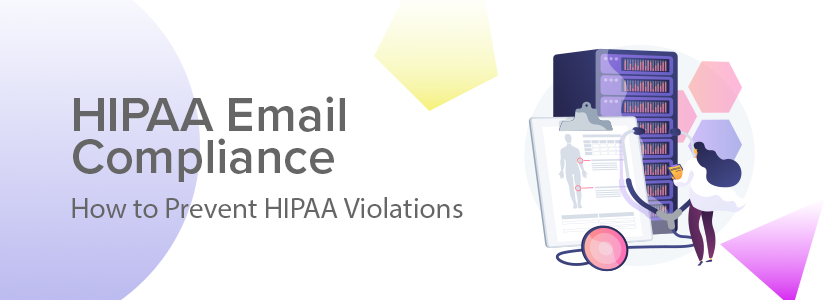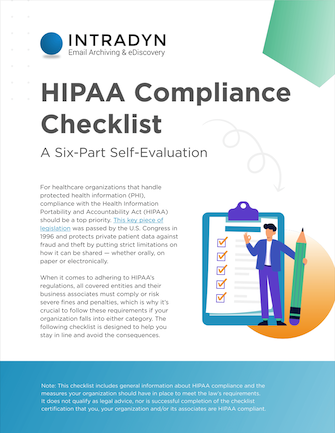HIPAA Email Compliance: How to Avoid HIPAA Violations

In today’s digital age, healthcare organizations increasingly depend on electronic communication to interact with patients, colleagues, and other stakeholders. While this shift improves efficiency, it also presents new challenges in maintaining the confidentiality and security of Protected Health Information (PHI). The Health Insurance Portability and Accountability Act (HIPAA) establishes strict standards to protect patient data, particularly in electronic communications such as email.
Failure to adhere to email security measures can lead to HIPAA violations, which may result in hefty fines, legal actions, and damage to your organization’s reputation. This guide explores the complexities of HIPAA email compliance and provides actionable insights to help your organization prevent violations and maintain the highest standards of patient privacy—a responsibility we all share.
Understanding HIPAA and Its Relevance to Email Communication
Enacted in 1996, HIPAA aims to protect sensitive patient health information from being disclosed without the patient’s consent or knowledge. The act encompasses several rules, but two are particularly pertinent to email communications:
- Privacy Rule: Establishes national standards for the protection of PHI.
- Security Rule: Sets standards for securing electronic PHI (ePHI), ensuring its confidentiality, integrity, and availability.
Under these rules for healthcare providers and their business associates must implement appropriate safeguards to protect ePHI transmitted via email.

The Importance of HIPAA Email Compliance
Email remains a primary mode of communication in healthcare settings, used for everything from appointment reminders to sharing test results. However, without proper safeguards, emails can become a significant vulnerability, leading to unauthorized access to PHI.
Ensuring HIPAA email compliance is not just about avoiding penalties; it’s about maintaining patient trust and delivering quality care. Patients expect their personal health information to be handled with the utmost confidentiality. By adhering to HIPAA guidelines, healthcare organizations demonstrate their commitment to protecting patient privacy.
Common HIPAA Violations in Email Communication
Understanding potential pitfalls is crucial in preventing HIPAA violations. Here are some common email-related infractions:
1. Sending Unencrypted Emails Containing PHI:
Transmitting PHI without encryption can expose sensitive data to unauthorized parties.
2. Misdirected Emails:
Accidentally sending an email containing PHI to the wrong recipient can constitute a breach.
3. Lack of Access Controls:
Failing to implement proper access controls can allow unauthorized individuals within an organization to access PHI.
4. Improper Disposal of Emails:
Deleting emails containing PHI without ensuring they are unrecoverable can lead to unauthorized access.
Common HIPAA Email Violations and Their Consequences
In one real-life HIPAA violation, a physician who left his former practice sent a mass email to over 1,200 people, including former patients, without using the blind carbon copy (BCC) feature. This resulted in the unauthorized exposure of email addresses—classified as PHI when linked to healthcare services. The incident illustrates how even simple oversights in email protocol can lead to serious compliance breaches. Regular staff training and robust email policies are essential to prevent such mistakes.
| Violation Scenario | Why It’s a Violation | Potential Penalty |
| Sending PHI over unencrypted email | Unprotected sensitive data can be intercepted | Up to $50,000 per incident |
| Using personal email for PHI | Personal accounts lack appropriate safeguards | Regulatory scrutiny and fines |
| Misaddressed email with PHI | Unauthorized disclosure of patient information | Possible breach notification and fines |
| No staff training | Increases risk of accidental PHI disclosure | Organizational liability |
Best Practices for HIPAA-Compliant Email Communication
Implementing the following processes can help ensure your organization is doing all it can to prevent any violations of HIPAA email compliance laws:
- Restrict access to patient information through the use of specific password types or electronic identification of terminals within the medical department (essentially an electronic security clearance). Higher-level access is provided to the group who will be sending and receiving medical-related emails.
- Restrict the type of access inter-departmentally. For example, someone in the administrative office may need identifiers such as name and address in order to perform telephone or emailed satisfaction surveys. They may not need medical information to do so.
- Establish employee access limits and have clearly defined guidelines. For example, a local celebrity who is seen in the clinic may stimulate a lively conversation about why he is there. However, accessing his protected information to satisfy curiosity is illegal, as is sending emails about his condition.
- Instruct employees to always lock their computer screen whenever they will be away from their posts, even for a few moments. A gray screen is a great deterrent to “just sneak a peek” at an email that has been left open. Even an accidental viewing tends to stick in the mind. Instruct employees who share computers to sign off completely before allowing a coworker to use the terminal.
Regular training helps employees avoid common HIPAA violations related to email misuse.
Role of HIPAA Email Compliance Using Email Archiving
Companies affected by regulations can implement HIPAA-compliant email monitoring using virtual email archiving appliances that archive all necessary files without compromising the integrity, access or transmission of the information.
While some email archiving solutions may be difficult to implement and use in a company with multiple locations, organizations striving to remain HIPAA compliant with email correspondence can use top tier email archiving solutions to monitor and enforce email content through the web browser interface. Email information can be stored indefinitely or purged as needed using unique search and retrieval functions.
When companies are trying to adjust their protocols for HIPAA-compliant email strategies, the use of a virtual or hardware archiving appliance is a cost-efficient method that is easy to use in multiple office locations and protects both the company and the patient from concerns over access, integrity and content security issues.
To assess your organization’s Email Archiving compliance requirements, consider the following checklist:
| Requirement | Description |
| Encryption | Ensure emails with PHI are encrypted at rest and in transit |
| Access Controls | Limit email access to authorized personnel |
| Audit Controls | Monitor and log email access and transmission |
| Staff Training | Regularly train employees on email compliance policies |
| Business Associate Agreements | Ensure BAAs are in place with email service providers |
| Secure Email Platforms | Use HIPAA-compliant email services with built-in security features |
Conclusion
Maintaining HIPAA email compliance is an ongoing process that requires vigilance, education, and the right tools. By implementing best practices, investing in secure technologies, and fostering a culture of compliance, healthcare organizations can protect patient information and uphold their legal and ethical responsibilities.
By following these guidelines, you can reduce the risk of HIPAA violations and remain fully compliant.
Ready to strengthen your HIPAA email compliance? Contact us today.
Note: This article is for informational purposes only and does not constitute legal advice.

